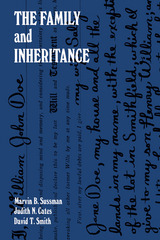
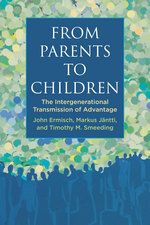
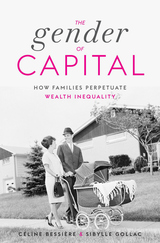
Two leading social scientists examine the gender wealth gap in countries with officially egalitarian property law, showing how legal professionals—wittingly and unwittingly—help rich families and men maintain their privilege.
In many countries, property law grants equal rights to men and women. Why, then, do women still accumulate less wealth than men? Combining quantitative, ethnographic, and archival research, The Gender of Capital explains how and why, in every class of society, women are economically disadvantaged with respect to their husbands, fathers, and brothers. The reasons lie with the unfair economic arrangements that play out in divorce proceedings, estate planning, and other crucial situations where law and family life intersect.
Céline Bessière and Sibylle Gollac argue that, whatever the law intends, too many outcomes are imprinted with unthought sexism. In private decisions, old habits die hard: families continue to allocate resources disproportionately to benefit boys and men. Meanwhile, the legal profession remains in thrall to assumptions that reinforce gender inequality. Bessière and Gollac marshal a range of economic data documenting these biases. They also examine scores of family histories and interview family members, lawyers, and notaries to identify the accounting tricks that tip the scales in favor of men.
Women across the class spectrum—from poor single mothers to MacKenzie Scott, ex-wife of Amazon billionaire Jeff Bezos—can face systematic economic disadvantages in divorce cases. The same is true in matters of inheritance and succession in family-owned businesses. Moreover, these disadvantages perpetuate broader social disparities beyond gender inequality. As Bessière and Gollac make clear, the appropriation of capital by men has helped to secure the rigid hierarchies of contemporary class society itself.
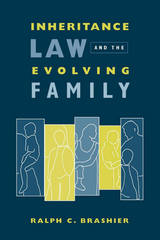
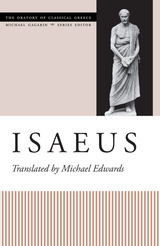
This is the eleventh volume in the Oratory of Classical Greece. This series presents all of the surviving speeches from the late fifth and fourth centuries BC in new translations prepared by classical scholars who are at the forefront of the discipline. These translations are especially designed for the needs and interests of today's undergraduates, Greekless scholars in other disciplines, and the general public.
Classical oratory is an invaluable resource for the study of ancient Greek life and culture. The speeches offer evidence on Greek moral views, social and economic conditions, political and social ideology, law and legal procedure, and other aspects of Athenian culture that have recently been attracting particular interest: women and family life, slavery, and religion, to name just a few.
The orator Isaeus lived during the fourth century BC and was said to be the teacher of Demosthenes, Athens' most famous orator. Of the fifty or more speeches he is believed to have written, eleven survive in whole, one as a large fragment, and others as smaller fragments. This volume presents all the surviving works of Isaeus. The speeches mainly deal with inheritances and are a vital source of information regarding Greek law in this important area. In addition to translating the speeches, Michael Edwards provides a general introduction to Isaeus and Athenian inheritance law, as well as specific introductions and notes for each speech.
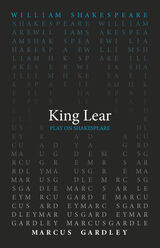
Marcus Gardley’s translation of King Lear renews the language of one of Shakespeare’s most frequently staged tragedies for a modern audience. Gardley’s update allows audiences to hear the play anew while still finding themselves in the tragic midst of Shakespeare’s play.
This translation of King Lear was written as part of the Oregon Shakespeare Festival’s Play On! project, which commissioned new translations of thirty-nine Shakespeare plays. These translations present the work of “The Bard” in language accessible to modern audiences while never losing the beauty of Shakespeare’s verse. Enlisting the talents of a diverse group of contemporary playwrights, screenwriters, and dramaturges from diverse backgrounds, this project reenvisions Shakespeare for the twenty-first century. These volumes make these works available for the first time in print—a new First Folio for a new era.
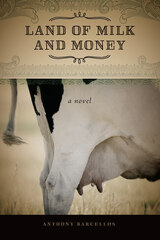
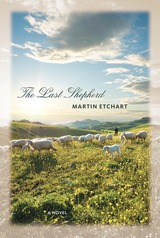
Matt’s journey to manhood takes place in a vividly depicted landscape populated by lively, memorable characters. This is the powerful story of a young man’s search for an identity that encompasses two cultures and one complex, scattered family.
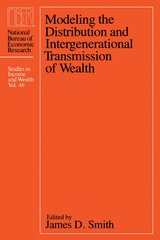

Barbara Jefferson, a young American teaching in Tokyo in the 1960s, is set on a life-changing quest when her Japanese surrogate mother, Michi, dies, leaving her a tansu of homemade plum wines wrapped in rice paper. Within the papers Barbara discovers writings in Japanese calligraphy that comprise a startling personal narrative. With the help of her translator, Seiji Okada, Barbara begins to unravel the mysteries of Michi's life, a story that begins in the early twentieth century and continues through World War II and its aftermath.
As Barbara and Seiji translate the plum wine papers they form an intimate bond, with Michi a ghostly third in what becomes an increasingly uneasy triangle. Barbara is deeply affected by the revelation that Michi and Seiji are hibakusha, survivors of the atomic bombing in Hiroshima, and even harder for her to understand are the devastating psychological effects wrought by war. Plum Wine examines human relationships, cultural differences, and the irreparable consequences of war in a story that is both original and timeless.
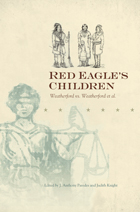
Red Eagle’s Children presents the legal proceedings in an inheritance dispute that serves as an unexpected window on the intersection of two cultural and legal systems: Creek Indian and Euro-American.
events that complement the narratives of professional historians.
David I. Durham / Robbie Ethridge / Judith
Knight / J. Anthony Paredes / Paul M. Pruitt
Jr. / Nina Gail Thrower / Robert Thrower /
Gregory A. Waselkov
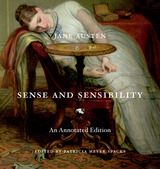
Sense and Sensibility (1811) marked the auspicious debut of a novelist identified only as “A Lady.” Jane Austen’s name has since become as familiar as Shakespeare’s, and her tale of two sisters has lost none of its power to delight. Patricia Meyer Spacks guides readers to a deeper appreciation of the richness of Austen’s delineation of her heroines, Elinor and Marianne Dashwood, as they experience love, romance, and heartbreak. On display again in the editor’s running commentary are the wit and light touch that delighted readers of Spacks’s Pride and Prejudice: An Annotated Edition.
In her notes, Spacks elucidates language and allusions that have become obscure (What are Nabobs? When is rent day?), draws comparisons to Austen’s other work and to that of her precursors, and gives an idea of how other critics have seen the novel. In her introduction and annotations, she explores Austen’s sympathy with both Elinor and Marianne, the degree to which the sisters share “sense” and “sensibility,” and how they must learn from each other. Both manage to achieve security and a degree of happiness by the novel’s end. Austen’s romance, however, reveals darker overtones, and Spacks does not leave unexamined the issue of the social and psychological restrictions of women in Austen’s era.
As with other volumes in Harvard’s series of Austen novels, Sense and Sensibility: An Annotated Edition comes handsomely illustrated with numerous color reproductions that vividly recreate Austen’s world. This will be an especially welcome addition to the library of any Janeite.

We all hope that we will be cared for as we age. But the details of that care, for caretaker and recipient alike, raise some of life’s most vexing questions. From the mid-nineteenth to the mid-twentieth century, as an explosive economy and shifting social opportunities drew the young away from home, the elderly used promises of inheritance to keep children at their side. Hendrik Hartog tells the riveting, heartbreaking stories of how families fought over the work of care and its compensation.
Someday All This Will Be Yours narrates the legal and emotional strategies mobilized by older people, and explores the ambivalences of family members as they struggled with expectations of love and duty. Court cases offer an extraordinary glimpse of the mundane, painful, and intimate predicaments of family life. They reveal what it meant to be old without the pensions, Social Security, and nursing homes that now do much of the work of serving the elderly. From demented grandparents to fickle fathers, from litigious sons to grateful daughters, Hartog guides us into a world of disputed promises and broken hearts, and helps us feel the terrible tangle of love and commitments and money.
From one of the bedrocks of the human condition—the tension between the infirmities of the elderly and the longings of the young—emerges a pioneering work of exploration into the darker recesses of family life. Ultimately, Hartog forces us to reflect on what we owe and are owed as members of a family.
READERS
Browse our collection.
PUBLISHERS
See BiblioVault's publisher services.
STUDENT SERVICES
Files for college accessibility offices.
UChicago Accessibility Resources
home | accessibility | search | about | contact us
BiblioVault ® 2001 - 2024
The University of Chicago Press









